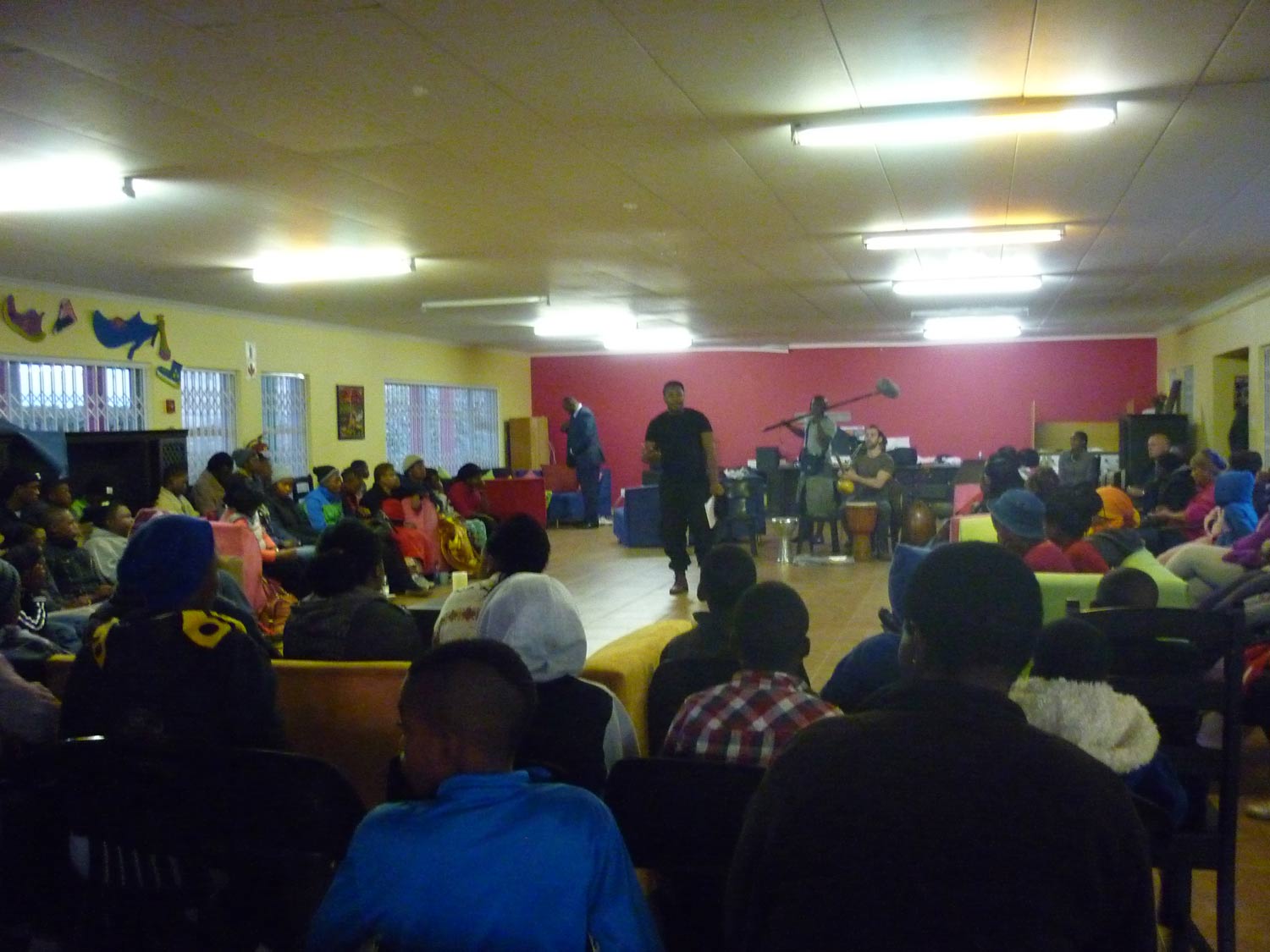
Much has changed on the tour in the past several days. For one, we’re no longer in Nairobi. For another, we’ve done two shows in a row, and neither of them were at schools.
That’s right, Antigone In The World has come to Johannesburg, the hometown of both our Antigone and our Kreon. And our inaugural Joburg performance took place in a correctional facility actually an hour outside the city.
We’re all traveling in one bus now, which gives our daily outings more of a family road-trip vibe, with all the good (Marcel, Peter, and Kea singing songs and cutting up in the back row) and bad (crushed knees, carsickness) that implies.
Pulling a trailer full of our gear, we rode our bus through the front gates and onto the grounds of the Baviaanspoort Correctional Centre. We’ve been asked, for security purposes, not to share details regarding the interior layout of the centre, but we were treated to a short presentation, over tea and cakes, that outlined much of what was going on there.
Baviaanspoort has 616 hectares of farmland where the prisoners grow vegetables and raise animals for dairy as well as meat. The produce is used to feed the residents of the Baviaanspoort Centre and also distributed to other centres around the Gauteng Region. Their dairy holds 67 milk cows, who produce 20,800 liters of milk per month, all of which goes to the offenders. The commissioners who welcomed us also spoke quite proudly of their 2,700 pig piggery (a new word for me). In addition to farming, the men and boys at the centre have the option to participate in skills workshops and to assist on outside projects (many of which appear to be community-service oriented).
We learned we would be performing for 120 residents of the juvenile detention centre as well as a class of primary school students visiting for the day. Confusingly, both the students and the inmates wore maroon uniforms, and a bobbing blanket of red greeted us on entering the auditorium.
In addition to being our first show not primarily for students, this must have been our first show for a majority male audience. When Marcel and Peter called for the first “Woosh” they were knocked back by the resounding bass of 120 adolescent male voices.
After the show, several young men had the chance to take the microphone and make remarks on the content of the play. Several were quick to castigate Kreon for his arrogance. Another made a comparison to the biblical story of Exodus: like Pharaoh, Kreon refused to see his error until his son was taken from him.
Today was our busiest day yet, so unfortunately we were not able to hang around and mingle with the audience as much as we are used to. In fact, we couldn’t even sit for the light lunch our hosts at prepared for us. They were kind enough to pack a massive tray of finger foods into the van, and we spent the next hour on the road, carefully passing it up and down the aisle.
Our second destination was Nkosi’s Haven, a shelter for HIV positive mothers and children, named after an outstanding young activist, Nkosi Johnson, who passed away in 2001, at the age of twelve. The moment we walked in I could feel a surge in the company’s spirits. We slipped through the kitchen, where several residents were eating, and into the performance space, which was filled with big cushy couches in Fruit Loop colors.
Those couches were so great we made them into the front row of our audience seating.
In the end we had a house of 70-80, mixing kids and mothers. It seemed to me they were our most attentive crowd to the language of the play. Small turns of phrase could elicit gasps. They were extraordinarily appreciative and hung around for most of an hour afterwards to talk to the cast. For our part, we left riding a total high.
George, who is driving us during our time in Joburg, drove us to Soweto for dinner, giving us an impromptu tour, pointing our Mandela’s House and other sites of major historical incidents. Mosher, who had not been to the city for 30 years, said the changes that had taken place were beyond description: “this city was evil” in the 80s, he said over dinner. George shared with us some of his own stories from the apartheid era, impressing on me yet again my role as tourist and interloper in other peoples’ homes. And yet I’m lucky to be on this tour, lucky to visit these extraordinary communities, and lucky to be invited in by so many generous hosts.
-Steve Foglia


